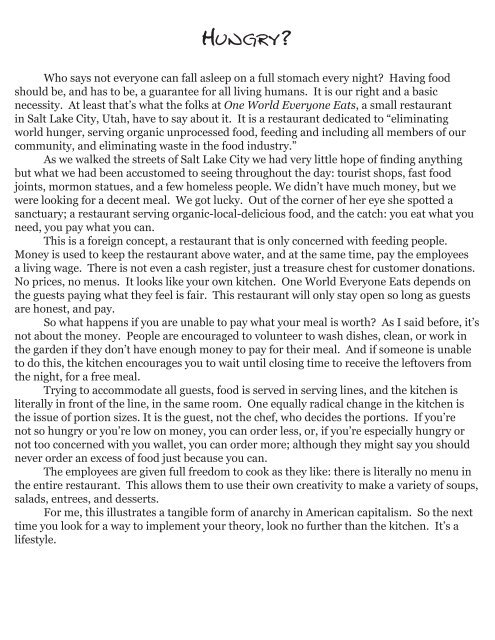Illegitimi non carborundum
Illegitimi non carborundum
Illegitimi non carborundum
Create successful ePaper yourself
Turn your PDF publications into a flip-book with our unique Google optimized e-Paper software.
Hungry?<br />
Who says not everyone can fall asleep on a full stomach every night? Having food<br />
should be, and has to be, a guarantee for all living humans. It is our right and a basic<br />
necessity. At least that’s what the folks at One World Everyone Eats, a small restaurant<br />
in Salt Lake City, Utah, have to say about it. It is a restaurant dedicated to “eliminating<br />
world hunger, serving organic unprocessed food, feeding and including all members of our<br />
community, and eliminating waste in the food industry.”<br />
As we walked the streets of Salt Lake City we had very little hope of finding anything<br />
but what we had been accustomed to seeing throughout the day: tourist shops, fast food<br />
joints, mormon statues, and a few homeless people. We didn’t have much money, but we<br />
were looking for a decent meal. We got lucky. Out of the corner of her eye she spotted a<br />
sanctuary; a restaurant serving organic-local-delicious food, and the catch: you eat what you<br />
need, you pay what you can.<br />
This is a foreign concept, a restaurant that is only concerned with feeding people.<br />
Money is used to keep the restaurant above water, and at the same time, pay the employees<br />
a living wage. There is not even a cash register, just a treasure chest for customer donations.<br />
No prices, no menus. It looks like your own kitchen. One World Everyone Eats depends on<br />
the guests paying what they feel is fair. This restaurant will only stay open so long as guests<br />
are honest, and pay.<br />
So what happens if you are unable to pay what your meal is worth? As I said before, it’s<br />
not about the money. People are encouraged to volunteer to wash dishes, clean, or work in<br />
the garden if they don’t have enough money to pay for their meal. And if someone is unable<br />
to do this, the kitchen encourages you to wait until closing time to receive the leftovers from<br />
the night, for a free meal.<br />
Trying to accommodate all guests, food is served in serving lines, and the kitchen is<br />
literally in front of the line, in the same room. One equally radical change in the kitchen is<br />
the issue of portion sizes. It is the guest, not the chef, who decides the portions. If you’re<br />
not so hungry or you’re low on money, you can order less, or, if you’re especially hungry or<br />
not too concerned with you wallet, you can order more; although they might say you should<br />
never order an excess of food just because you can.<br />
The employees are given full freedom to cook as they like: there is literally no menu in<br />
the entire restaurant. This allows them to use their own creativity to make a variety of soups,<br />
salads, entrees, and desserts.<br />
For me, this illustrates a tangible form of anarchy in American capitalism. So the next<br />
time you look for a way to implement your theory, look no further than the kitchen. It’s a<br />
lifestyle.














![The Philosophy of Progress [pdf]](https://img.yumpu.com/14077359/1/190x245/the-philosophy-of-progress-pdf.jpg?quality=85)

